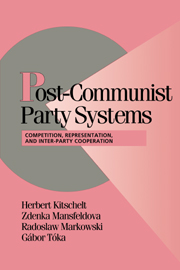Book contents
- Frontmatter
- Contents
- List of Figures and Tables
- Acknowledgments
- Introduction: Democracy and Party Competition
- Part I Theory: Party Systems and the Procedural Quality of Post-Communist Democracy
- Part II Setting and Research Strategy
- 3 From Communist Rule to Democracy: Four Central and East European Countries
- 4 Empirical Research Strategy
- Part III The Structuring of Party Competition
- Part IV Political Alignments and Dimensions of Competition
- Part V Political Representation and the Quality of Democratic Governance
- Conclusion
- Appendix I List of Political Parties and Electoral Alliances
- Appendix II Questionnaire for the Elite Study
- Appendix III Population Survey Questions (Policy Opinions)
- Bibliography
- Index
- More Titles in the series
3 - From Communist Rule to Democracy: Four Central and East European Countries
Published online by Cambridge University Press: 05 June 2012
- Frontmatter
- Contents
- List of Figures and Tables
- Acknowledgments
- Introduction: Democracy and Party Competition
- Part I Theory: Party Systems and the Procedural Quality of Post-Communist Democracy
- Part II Setting and Research Strategy
- 3 From Communist Rule to Democracy: Four Central and East European Countries
- 4 Empirical Research Strategy
- Part III The Structuring of Party Competition
- Part IV Political Alignments and Dimensions of Competition
- Part V Political Representation and the Quality of Democratic Governance
- Conclusion
- Appendix I List of Political Parties and Electoral Alliances
- Appendix II Questionnaire for the Elite Study
- Appendix III Population Survey Questions (Policy Opinions)
- Bibliography
- Index
- More Titles in the series
Summary
Although Bulgaria, the Czech Republic, Hungary, and Poland shared the experience of communist rule in the shadow of Soviet hegemony since the 1940s, the arrival of democracy in each of these countries has been embedded in the diverging economic and institutional configurations of bureaucratic-authoritarian, national-accommodative, or patrimonial communism. In this chapter we sketch the trajectory of these four countries to illustrate the power of regime legacies, but also in order to show our awareness that beyond systematic path dependence the regime changes involve historical contingencies we can only narrate, but not incorporate into a parsimonious theoretical framework. Faced with an uncertain, open situation, new political actors with little experience are destined to experiment with innovative strategies and learn from feedback. The degrees of freedom the actors take advantage of, however, are limited by the distribution of resources and by mutual expectations about the relevant participants' strategic moves, both of which are influenced by historical legacies. Furthermore, the domestic actors cannot choose the international setting in which they are placed.
Strategic interaction in the initial phase of a new democracy is a nonequilibrium process. Because actors have limited experience, construct new institutions, and define their interests and strategies, it is unlikely that democratic arrangements as stable as those of Western democracies emerge quickly. The conduct of parties and the dynamic of party systems are a case in point.
- Type
- Chapter
- Information
- Post-Communist Party SystemsCompetition, Representation, and Inter-Party Cooperation, pp. 95 - 132Publisher: Cambridge University PressPrint publication year: 1999



